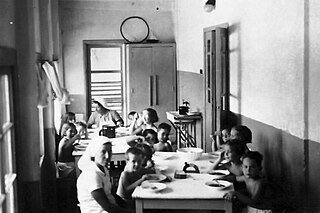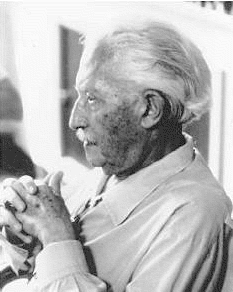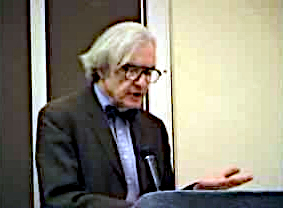Related Research Articles

Psychology is the scientific study of mind and behavior. Psychology includes the study of conscious and unconscious phenomena, including feelings and thoughts. It is an academic discipline of immense scope, crossing the boundaries between the natural and social sciences. Psychologists seek an understanding of the emergent properties of brains, linking the discipline to neuroscience. As social scientists, psychologists aim to understand the behavior of individuals and groups. Ψ is a Greek letter which is commonly associated with the science of psychology.
Psychohistory is an amalgam of psychology, history, and related social sciences and the humanities. It examines the "why" of history, especially the difference between stated intention and actual behavior. Psychobiography, childhood, group dynamics, mechanisms of psychic defense, dreams, and creativity are primary areas of research. It works to combine the insights of psychology, especially psychoanalysis, with the research methodology of the social sciences and humanities to understand the emotional origin of the behavior of individuals, groups and nations, past and present. Work in the field has been done in the areas of childhood, creativity, dreams, family dynamics, overcoming adversity, personality, political and presidential psychobiography. There are major psychohistorical studies of anthropology, art, ethnology, history, politics and political science, and much else.

Carl Gustav Jung was a Swiss psychiatrist and psychoanalyst who founded analytical psychology. Jung's work has been influential in the fields of psychiatry, anthropology, archaeology, literature, philosophy, psychology, and religious studies. Jung worked as a research scientist at the famous Burghölzli hospital, under Eugen Bleuler. During this time, he came to the attention of Sigmund Freud, the founder of psychoanalysis. The two men conducted a lengthy correspondence and collaborated, for a while, on a joint vision of human psychology.

Lloyd deMause was an American social thinker known for his work in the field of psychohistory. He did graduate work in political science at Columbia University and later trained as a lay psychoanalyst, which is defined as a psychoanalyst who does not have a medical degree. He is the founder of The Journal of Psychohistory.
Early infanticidal childrearing is a term used in the study of psychohistory that refers to infanticide in paleolithic, pre-historical, and historical hunter-gatherer tribes or societies. "Early" means early in history or in the cultural development of a society, not to the age of the child. "Infanticidal" refers to the high incidence of infants killed when compared to modern nations. The model was developed by Lloyd deMause within the framework of psychohistory as part of a seven-stage sequence of childrearing modes that describe the development attitudes towards children in human cultures The word "early" distinguishes the term from late infanticidal childrearing, identified by deMause in the more established, agricultural cultures up to the ancient world.

The Westermarck effect, also known as reverse sexual imprinting, is a psychological hypothesis that people tend not to be attracted to peers with whom they lived like siblings before age six. This hypothesis was first proposed by Finnish anthropologist Edvard Westermarck in his book The History of Human Marriage (1891) as one explanation for the incest taboo.

Pseudohistory is a form of pseudoscholarship that attempts to distort or misrepresent the historical record, often by employing methods resembling those used in scholarly historical research. The related term cryptohistory is applied to pseudohistory derived from the superstitions intrinsic to occultism. Pseudohistory is related to pseudoscience and pseudoarchaeology, and usage of the terms may occasionally overlap. Although pseudohistory comes in many forms, scholars have identified many features that tend to be common in pseudohistorical works; one example is that the use of pseudohistory is almost always motivated by a contemporary political, religious, or personal agenda. Pseudohistory also frequently presents sensational claims or a big lie about historical facts which would require unwarranted revision of the historical record.
Robopsychology is the study of the personalities and behavior of intelligent machines. The term was coined by Isaac Asimov in the short stories collected in I, Robot, which featured robopsychologist Dr. Susan Calvin, and whose plots largely revolved around the protagonist solving problems connected with intelligent robot behaviour. The term has been also used in some academic studies from the field of psychology and human–computer interactions.

Erik Homburger Erikson was a German-American developmental psychologist and psychoanalyst known for his theory on psychological development of human beings. He coined the phrase identity crisis.

Robert Jay Lifton is an American psychiatrist and author, chiefly known for his studies of the psychological causes and effects of wars and political violence, and for his theory of thought reform. He was an early proponent of the techniques of psychohistory.
Psychohistory is a fictional science in Isaac Asimov's Foundation universe which combines history, sociology, and mathematical statistics to make general predictions about the future behavior of very large groups of people, such as the Galactic Empire. It was first introduced in the four short stories (1942–1944) which would later be collected as the 1951 novel Foundation.
Prenatal psychology can be seen as a part of developmental psychology, although historically it was developed in the heterogenous field of psychoanalysis. Its scope is the description and explanation of experience and behaviour of the individual before birth and postnatal consequences as well. In so far as the actual birth process is involved one can consider this perinatal psychology. Pre- and perinatal aspects are often discussed together.

Martin Elias Peter Seligman is an American psychologist, educator, and author of self-help books. Seligman is a strong promoter within the scientific community of his theories of positive psychology and of well-being. His theory of learned helplessness is popular among scientific and clinical psychologists. A Review of General Psychology survey, published in 2002, ranked Seligman as the 31st most cited psychologist of the 20th century.
The Journal of Psychohistory is a journal established in 1973 in the field of psychohistory, edited by Lloyd deMause and published by the Institute for Psychohistory(IP). The journal has been originally published as History of Childhood Quarterly and since 1976 as The Journal of Psychohistory.
Henry Stuart Hughes (1916–1999) was an American historian, professor, and activist. He advocated the application of psychoanalysis to history.

The psychology of science is a branch of the studies of social science defined most simply as the study of scientific thought or behavior. It is a collection of studies of various topics. The thought of psychology has been around since the late 19th century. Research on the psychology of science began in 1874, the field has seen a substantial expansion of activity in recent years. The specific field of psychology as a science first gained popularity mostly in the 1960s, with Abraham Maslow publishing an influential text on the subject, but this popularity faded, only re-emerging in the 1980s. Other studies of science include philosophy of science, history of science, and sociology of science or sociology of scientific knowledge.
Peter J. Loewenberg is a teacher of “European cultural, intellectual, German, Austrian and Swiss history. Political Psychology, integrating the identities of an historian and political psychologist with the clinical practice of psychoanalysis” at UCLA.
Bruce Mazlish was an American historian who was a professor in the Department of History at the Massachusetts Institute of Technology. His work focused on historiography and philosophy of history, history of science and technology, artificial intelligence, history of the social sciences, the two cultures and bridging the humanities and sciences, revolution, psychohistory, history of globalization and the history of global citizenship. He worked to build the latter two fields of inquiry into a public intellectual movement, through initiatives such as the New Global History conferences.
Clio’s Psyche: Understanding the “Why” of Culture, Current Events, History, and Society: is an academic journal established in 1994 by the Psychohistory Forum (1982–) to further interdisciplinary knowledge of society and history utilizing the tools of applied psychoanalysis, political psychology, psychobiography, psychohistory, and related disciplines. It is part of the innovative field of psychohistory and it was created by the members of the Forum to both keep a record of the scholarship the psychohistory forum was nurturing. Initially, it started as a newsletter and before long became a full length, double-blind refereed journal, one of several in the field. Its website is at cliospsyche.org. and issues a year or more old may be found there along with a listing of all interviews, issues, and memorials.
Robin Stern is an American psychoanalyst at Yale University, associate director for the Yale Center for Emotional Intelligence, an associate research scientist at the Yale Child Study Center, and is on the faculty of Teachers College, Columbia University.
References
- ↑ Tileagă, Cristian; Byford, Jovan (2014). Psychology and History: Interdisciplinary Explorations. Cambridge University Press. ISBN 978-1-107-03431-0.
- ↑ Runyan, William McKinley (1988). Psychology and Historical Interpretation. New York: Oxford University Press. pp. 17–30. ISBN 0-19-505327-3.